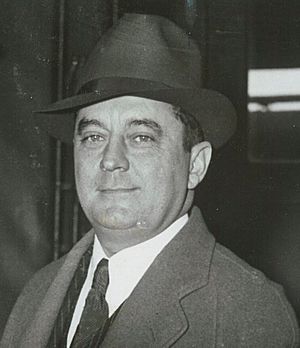Joseph A. Gavagan facts for kids
Quick facts for kids
Joseph Andrew Gavagan
|
|
|---|---|

Joseph A. Gavagan, Congressman from New York, 1939.
|
|
| Member of the New York State Assembly from the New York County, 22nd district |
|
| In office 1923–1929 |
|
| Preceded by | Michael E. Reiburn |
| Succeeded by | Benjamin B. Mittler |
| Member of the U.S. House of Representatives from New York's 21st district |
|
| In office November 5, 1929 – December 30, 1943 |
|
| Preceded by | Royal H. Weller |
| Succeeded by | James H. Torrens |
| Personal details | |
| Born | August 20, 1892 New York City, New York, U.S. |
| Died | October 18, 1968 (aged 76) Putnam Memorial Hospital, Bennington, Vermont, U.S. |
| Resting place | Gate of Heaven Cemetery |
| Political party | Democratic |
Joseph Andrew Gavagan (born August 20, 1892 – died October 18, 1968) was an American politician. He was a veteran of World War I and a lawyer. Gavagan served for many years as a U.S. Representative for New York State. He held this important role from 1929 to 1943.
Contents
Early Life and Education
Joseph Gavagan was born in New York City on August 20, 1892. He went to public and church schools as a child. Later, he studied law at Fordham University. He graduated from law school in 1920.
Serving in World War I
During World War I, Joseph Gavagan joined the army. He started as a private soldier. He was later promoted to second lieutenant. This rank is an officer position. He served in the Quartermaster Corps. This part of the army handles supplies and logistics.
He served from August 1917 to October 1919. His service took him to places like Fort Totten in New York. He also served at Camp Alfred Vail in New Jersey. Another place he served was Camp Gordon Johnston in Florida. After the war, he was a first lieutenant in the Quartermaster Reserve Corps until 1925.
Becoming a Politician
After the war, Gavagan became a lawyer in New York City in 1920. He was a member of the Democratic Party. He began his political career in the New York State Assembly. This is a part of New York's state government. He served there from 1923 to 1929.
Fighting for Fairness in Congress
In 1929, Gavagan was elected to the United States House of Representatives. He served seven terms, from November 5, 1929, until December 30, 1943. In Congress, he led committees. These included the Committee on Elections No. 2 and the Committee on War Claims.
Joseph Gavagan worked hard to pass a law against lynching. Lynching was when a mob would illegally kill someone, often because of their race. Gavagan grew up in Hell's Kitchen in New York. He saw people from different backgrounds face unfair treatment. He believed that mob rule was wrong. He argued that everyone deserved fair treatment under the law.
His bill to stop lynching did not pass at the time. Some politicians from the southern states blocked it. Years later, a former Senator named Claude Pepper said he regretted not supporting Gavagan's anti-lynching law. This shows how important Gavagan's efforts were.
Later Life and Legacy
Gavagan left Congress in 1943. He was elected as a judge for the New York Supreme Court. He was re-elected in 1957. He planned to retire from being a judge at the end of 1968.
He passed away on October 18, 1968, in Vermont. He was buried in Gate of Heaven Cemetery in New York.
Family Life
In 1933, Joseph Gavagan married Dorothy Whitehead. She had worked as his secretary in his Washington office. They had two children. Their son was named Joseph Jr. Their daughter, Joan, later married Thomas G. Gorman.
 | James B. Knighten |
 | Azellia White |
 | Willa Brown |

